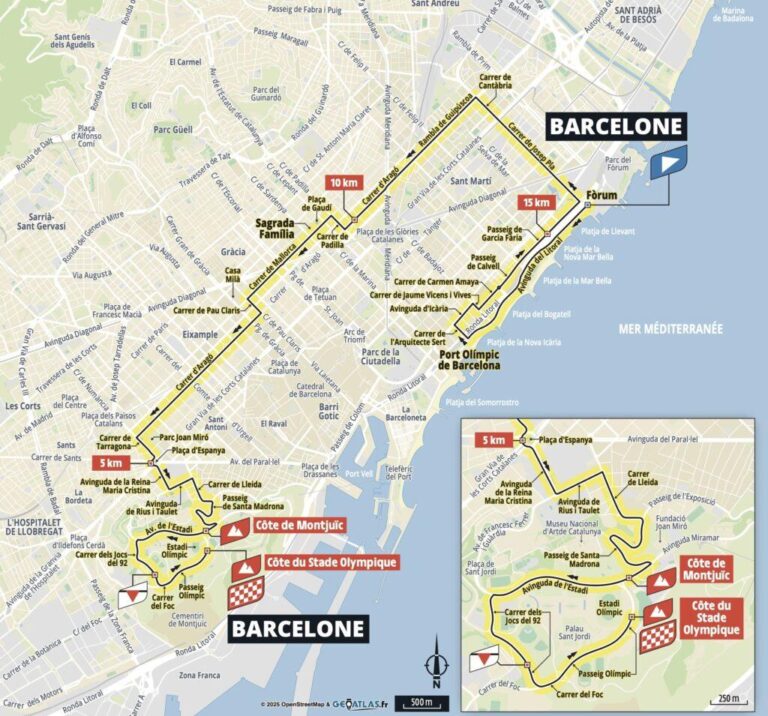Barcelona to Host 2026 Tour de France Kickoff at Iconic 1992 Olympic Stadium
In a stunning announcement that has excited cycling fans and city officials alike, the 2026 Tour de France will commence in Barcelona, with the first two stages culminating at the historic 1992 Olympic Stadium. As the prestigious race returns to the vibrant streets of the Catalonian capital, it marks a significant moment for both the Tour and the city, which has long been celebrated for its rich sporting heritage and architectural marvels. With a backdrop of stunning coastal views and the spirit of the Olympics, this edition promises to deliver thrilling competition and a unique celebration of cycling in one of Europe’s most iconic cities.
Barcelona to Host Grand Start of Tour de France 2026 with Olympic Legacy
Barcelona is set to make history as the starting point for the 2026 Tour de France, a move that celebrates both its rich cycling tradition and its Olympic legacy. The opening two stages will culminate at the iconic 1992 Olympic Stadium, a venue that symbolizes the city’s transformation and commitment to sports excellence. This exciting convergence of events not only honors the past but also positions Barcelona as a central hub for international sporting events. The local government has promised significant investments in infrastructure and community engagement to ensure that the world-class cycling event is embraced by both locals and visitors alike.
To support this landmark event, organizers are implementing a series of initiatives aimed at enhancing the overall spectator experience. These include:
- Extended public transportation options to accommodate the influx of tourists.
- Interactive fan zones around the city featuring cycling exhibitions and local food vendors.
- Security enhancements ensuring the safety of participants and fans during the event.
Key details regarding the first stages of the Tour will be released in the coming months. Excitement is already brewing among the cycling community and fans alike, as Barcelona prepares to showcase its vibrant culture alongside one of the most prestigious cycling races in the world.
Significance of the 1992 Olympic Stadium as a Stage for Cycling Excellence
The 1992 Olympic Stadium, a landmark of architectural innovation, has long been recognized as more than just a venue for sporting events; it embodies the spirit of athletic achievement and excellence. Hosting the cycling events during the Barcelona Olympics, this stadium is steeped in history, offering an inspiring backdrop for competitors. Its well-preserved legacy, marked by thrilling competitions and exhilarating finishes, sets the stage for the Tour de France’s grand entrance. As the cyclists race towards this iconic structure, they will not only aim for victory but also seek to resonate with the echoes of Olympic glory that continue to inspire generations of athletes.
Significantly, the stadium’s design and accessibility have made it a prime location for high-stakes competitions, fostering a vibrant atmosphere that enhances the experience for both athletes and spectators. Features that elevate its status include:
- Capacity: Accommodates a large audience, ensuring passionate support for the riders.
- Legacy: A history of hosting transformative events, creating an aura of prestige.
- Modern Facilities: Top-notch amenities that cater to the needs of teams and fans alike.
As the world prepares for the thrilling spectacle of the Tour de France, the 1992 Olympic Stadium stands poised to reclaim its place in the cycling spotlight. The combination of its rich history and the high stakes of this elite sporting event promises to deliver excitement and memories that resonate beyond the race itself.
Tourist Impact and Economic Opportunities from the Tour de France Arrival
The arrival of the Tour de France in Barcelona promises to not only boost tourism but also catalyze significant economic opportunities within the region. As the city prepares for this prestigious event, local businesses are gearing up to accommodate an influx of visitors. Anticipated benefits include:
- Increased Hotel Bookings: With thousands flocking to witness the race, hotels and accommodations are likely to see a surge in occupancy rates.
- Restaurant Patronage: Local eateries can expect higher foot traffic, leading to increased sales during the racing period.
- Retail Growth: Shops and souvenirs targeting cycling enthusiasts may experience heightened demand, boosting local commerce.
Moreover, the event serves as a platform to showcase Barcelona’s rich cultural heritage and vibrant community. Investment in infrastructure improvements, such as public transportation enhancements and road maintenance, will also leave a lasting legacy. With that in mind, a closer look at projected financial benefits reveals the following:
| Projected Revenue | Source |
|---|---|
| €15 million | Tourism sector |
| €5 million | Hospitality and dining |
| €2 million | Local merchandise sales |
This influx of capital not only supports existing businesses but also lays the groundwork for future investments, ensuring that the impact of the Tour de France is felt long after the cyclists depart. The combination of international attention and local pride will undoubtedly enhance Barcelona’s profile as a premier tourist destination.
What to Expect: Stages, Routes, and Challenges Ahead for Cyclists in Barcelona
The upcoming Tour de France promises to be an exhilarating journey for cyclists embarking from Barcelona, as the city’s iconic venues and scenic routes set the stage for the first two stages. Competitors will navigate through breathtaking landscapes and historic neighborhoods, offering spectators a chance to immerse themselves in the spirit of cycling. Among the highlights are routes that will take cyclists past the Sagrada Familia and the Barceloneta Beach, making it not just a test of endurance, but a visual feast for fans and athletes alike.
However, riders will face a myriad of challenges that test their mettle. The varied terrains will demand strategic pacing and adaptability, as competitors move from urban settings to the hilly outskirts of Barcelona. Among the challenges to anticipate are:
- Steep climbs: Routes will include significant elevation gains that will be pivotal in determining stage winners.
- Urban obstacles: Navigating through bustling city streets may slow down momentum and require tactical maneuvering.
- Weather conditions: The Mediterranean climate can shift rapidly, affecting cyclists’ performance and strategy.
| Stage | Distance (km) | Key Features |
|---|---|---|
| Stage 1 | 200 | Sagrada Familia, MontjuĂŻc Park |
| Stage 2 | 180 | Barceloneta Beach, Olympic Stadium |
The Conclusion
As the excitement builds for the 2026 Tour de France, the decision to kick off this iconic race in Barcelona, with its first two stages culminating at the historic 1992 Olympic Stadium, marks a significant return to a city rich in cycling tradition and Olympic heritage. With stunning vistas and a challenging course, Barcelona is poised to provide both riders and fans an unforgettable experience. As the cycling world gears up for this monumental event, anticipation grows for what promises to be an exhilarating start to the 2026 edition of the Tour de France. Stay tuned for updates as the race date approaches and the countdown to the grand départ begins.




